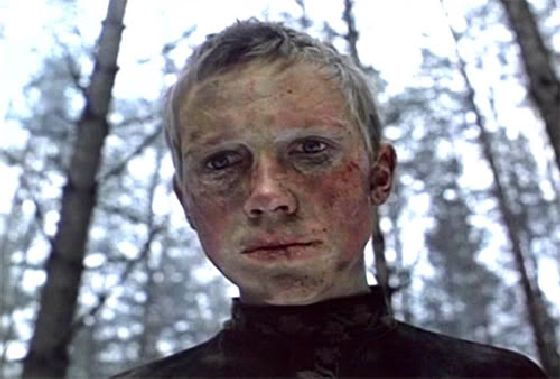Come and See (1985) 

Director: Elem Klimov
Cast: Aleksey Kravchenko, Olga Mironova, Liubomiras Lauciavicius
Synopsis: After finding an old rifle, a young boy joins the Soviet Army and experiences the horrors of World War II.
War movies have long been a staple of the movie industry. It’s a convenient arena for acts of heroism, for tales of the endless human struggle against evil. But what they rarely do is provide us with a reliable window into history. Most of what we see is censored and sanitised, stripped of much of the horrors and indignities of war in order to provide palatable (and profitable) entertainment. If every war movie described the human condition in the same bleak and uncompromising manner in which Elem Klimov’s Come and See there would be little appetite for war, real or fictionalised; our disgust at the human capacity for evil and despicable acts would preclude most rational people from even considering participation in a barbaric pastime that provides so few solutions but demands such a high price. Klimov’s Come and See rips the scales from our eyes with brutal frankness as it forces us to witness the true cost of war.
Aleksay Kravchenko plays Florya Gaishun, a 14-year-old boy living in rural Belarus in 1943. Florya dreams of joining up with the resistance movement and fighting Nazis. However, the Soviet resistance is so ill-equipped that he’s prevented from joining until he can provide his own weapon. After finally finding a rifle buried in the sand at the site of a previous battle, Florya proudly wins his place in the resistance, much to his mother’s disapproval. Not only does she fear for his life, but she and Florya’s little twin sisters rely on him for income.
His mother perhaps also understands the realities of war more than her son (and the audience), but Florya’s head is undoubtedly filled with the possibility of heroic encounters with the enemy. However, life with the resistance is far from the exciting existence he anticipated. They live rough in the woods, and rather than engaging in enemy action — the Nazis, in fact, are barely glimpsed for the first hour of the film — Florya finds himself performing menial tasks or on sentry duty. He’s even forced to give his new boots to a more experienced rebel.
While the unit is away, leaving Florya to guard their camp, he encounters Glasha (Olga Mironova), a pretty young girl attached to the rebels. Both flee together when the camp is bombed. Deafened by the blasts, Florya is traumatised and takes Glasha home with him. However, he finds the village and his house deserted, although soup is heating on the stove. Suddenly convinced that the villagers are hiding on an island in the marshlands nearby, he dashes off to find them with Glasha closely following. What Glasha sees — but Florya does not — is a pile of bloodied naked corpses lying in a heap behind a barn.
Things grow progressively worse for Florya as the film unfolds, and the bare wasteland in which the story takes place begins to resemble some strange post-apocalyptic landscape, deserted of people. In a moment of quietly horrifying surrealism we see a scrawny, muddied stork wandering listlessly around. The soundtrack records muted noise overshadowed by a distant ringing, an approximation of Florya’s temporary deafness which also illustrates his unbalanced state of mind.
Things get no better when Florya finds the surviving villagers. His mother is dead, they tell him. He goes on what is supposed to be a simple mission to find food with a group of men, but that too ends in tragedy. Although on paper it seems impossible for one person to encounter so much hardship and tragedy in such a short space of time, it never feels that way on screen. Events unfold in an almost detached, dispassionate fashion, without drama or sentimentality. Death and violence are treated with a matter-of-fact casualness that nevertheless does nothing to diminish their bruising impact on the viewer, and Florya’s journey begins to resemble Dante’s descent into the increasingly horrifying levels of hell.
That hell is complete with the arrival of the Nazis, a drunken, swaggering Bacchanalian parade of destruction beyond reason or redemption. The stark horror of the atrocities they inflict upon the simple village peasants would be unbelievable if they were not based on fact. And each act of inhuman evil witnessed by Florya, each indignity visited on the living and the dead, each new psychological assault, leaves its mark on his face so that, by the movie’s end, the fresh-faced boy resembles a wizened old man, consumed by a strange cocktail of terror, bitterness and rage. And while it’s impossible for us to share his trauma, we are shocked by what we witness. Such inhuman cruelty seems inconceivable.
Come and See is a difficult film to watch, not only because of its harrowing subject matter, but also because of the Russian style of moviemaking which means we get endless shots of Florya and others staring inexpressively at one another or straight at the camera. Those used to mainstream Hollywood movies will no doubt find that its pace is too slow, but give it a chance if you can. It deserves to be watched not only for its subject matter but because of the depth of feeling war survivors Klimov and screenwriter Ales Adamovich bring to it.
(Reviewed 18th April 2013)
httpv://www.youtube.com/watch?v=5nrlEbI0Ss0
